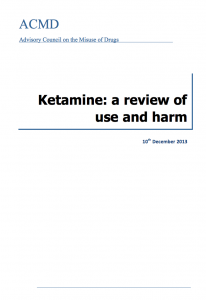
Major depression is a serious mental illness that often does not respond to mainstream drug treatment (antidepressants). In addition, there is usually a delay of 2-6 weeks before mood improves significantly. In situations like this, when at least two conventional antidepressants have been tried without success, depression is considered treatment-resistant. While multiple different strategies to deal with treatment-resistant depression have been suggested, “silver bullet” treatments are still lacking.
Ketamine has been shown to lead to rapid and sustained antidepressant relief even in treatment-resistant patients (Zarate et al., 2006). However, methodological limitations in the research have made it impossible to determine whether ketamine really is an antidepressant drug. For instance, most studies used an inactive placebo (i.e. a saline injection), which is problematic as ketamine produces strong dissociative side effects. As a consequence, it is likely that participants were able to infer whether they had been given ketamine or the placebo, which raises concerns regarding blinding. In addition, sample sizes have generally been very small which makes generalizability difficult.
A new ground-breaking study published in the American Journal of Psychiatry has gone some way to addressing these shortcomings (Murrough et al, 2013).
Methods

Ketamine has been in the news recently because the Advisory Council on the Misuse of Drugs have published a report entitled ‘Ketamine: a review of use and harm’
The authors randomised a total of 72 patients to receive either a single intravenous infusion of ketamine (n = 47) or midazolam (n = 25) under double-blind conditions.
Patients had previously failed on at least three conventional antidepressants, such as selective serotonin-reuptake inhibitors, to be eligible. Psychotic forms of depression were excluded and sufficient drug washout was ensured.
Midazolam is a short-acting benzodiazepine with side effects similar to ketamine but without any antidepressant effects, making it an ideal active placebo.
As the primary study endpoint, depression severity was assessed 24 hours after injection with the Montgomery-Asberg Depression Rating Scale (MADRS).
Results
- MADRS scores were 7.95 points lower in the ketamine group (95% CI, 3.2 to 12.71, Cohen’s d = 0.81, large effect)
- Odds of response (at least 50% reduction in MADRS scores) to ketamine was 2.18 higher than of response to midazolam (95% CI, 1.21 to 41.4)
- Response rate to ketamine was 64% versus 28% for midazolam
- Reported side effects (most commonly dizziness and headache) were similar across both groups and usually resolved within four hours
- There were no severe psychotic symptoms in any patient, although 17% experienced dissociative effects under ketamine
- After one week, differences between the treatment groups had vanished
Conclusions
The authors conclude that:
In this two-site trial in treatment-resistant patients with moderate-to-severe and persistent depressive symptoms, we found that a single low dose of ketamine, as compared with a psychoactive placebo control medication, was associated with a rapid-onset antidepressant effect.
Limitations

David Nutt (Chair of the Independent Scientific Committee on Drugs) has recently blogged about the harms associated with the planned rescheduling of the drug
Unfortunately, this study only assessed the effects of a single injection of ketamine. While effective in acute intervention, another main problem with current treatment is how to maintain mood improvement. From this perspective, it would have been interesting to study the effects of consecutive treatments, for instance on a weekly basis. Evidence from other studies (e.g. aan het Rot et al., 2010) suggest that this is feasible and highly efficacious. However, this point also highlights how little is known about the long-term effects of ketamine treatment. Also, it should be kept in mind that due to possible dissociative effects, ketamine will be restricted to non-psychotic forms of depression. While making sense clinically speaking, this is somewhat unfortunate, as psychotic depression is usually more severe and difficult to treat, making such patients more likely to be treatment-resistant.
From a methodological perspective, this study raises some doubts concerning the appropriateness of midazolam as an active control. While 17% of patients reported dissociative symptoms with ketamine, this was not found for midazolam. It would have been interesting to assess directly (i.e. via questionnaires) if participants were aware of their experimental condition after the infusion to rule out these concerns.
Summary
Ketamine seems to be an acutely safe and effective antidepressant. Yet, its application (i.e. intravenous infusion), ignorance of long-term health outcomes and dissociative properties highly restrain usage. In very severe cases and after careful screening, however, it could prove to be a useful tool for clinicians.
Links
Murrough, J.W.; Iosifescu, D.V.; Chang, L.C.; Al Jurdi, R.K.; Green, C.E.; Perez, A.M. et al. (2013). Antidepressant efficacy of ketamine in treatment-resistant major depression; a two-site randomized controlled trial. Am J Psychiatry, 170, 1134-1142. [PubMed abstract]
aan het Rot, M.; Collins, K.A.; Murrough, J.W.; Perez, A.M.; Reich, D.L.; Charney, D.S. et al. (2010). Safety and efficacy of repeated-dose intravenous ketamine for treatment-resistant depression (PDF). Biol Psychiatry, 67, 139-145. [PubMed abstract]
Zarate, C.A.; Singh, J.B.; Carlson, P.J.; Brutsche, N.E.; Ameli, R.; Luckenbaugh, D.A.; Charney, D.S., & Manji, H.K. (2006). A randomized trial of an N-methyl-D-aspartate antagonist in treatment-resistant major depression (PDF). Arch Gen Psychiatry, 63, 856-864. [PubMed abstract]


David Gardner interesting following your recent post…
Could ketamine be used as a safe and effective antidepressant for people with treatment-resistant depression? http://t.co/xSr79qDNMT
@Mental_Elf I expect injecting people with heroin when severely depressed would also make them feel better short term! Bad idea.
@paulinegrant1 @Mental_Elf Agree with Pauline medicating with drugs like Ketamine is not the answer for long term probs & is widely abused!
Largest RCT so far suggests that ketamine may be useful in the acute treatment of refractory… http://t.co/zE4lIaA0tK
@DrugScope What do you think of our blog on ketamine and depression? http://t.co/xSr79qDNMT
@Mental_Elf Thanks – your blog give us a useful analysis of this interesting research paper.
@ProfDavidNutt @Official_ISCD What do you think of our blog on ketamine and depression? http://t.co/xSr79qDNMT
@Mental_Elf Great blog! Ketamine may be too problematic itself but should lead us to a clinically useful relative. http://t.co/w11qQnIbaH
What are the options for people with treatment-resistant depression? http://t.co/xSr79qDNMT #ketamine
@Mental_Elf funny how discussions re ‘treatment-resistant’ depression never seem to mention life circumstances that cause depression
@Mental_Elf so if i’ve taken 4 different types does that mean im resistant?
Lack of info about long-term safety & dissociative properties restrain usage of ketamine for refractory depression http://t.co/xSr79qDNMT
Don’t miss: Largest RCT so far suggests that ketamine may be useful in the acute treatment of refractory depression http://t.co/xSr79qDNMT
@Mental_Elf Don’t forget that the MADRS measures symptoms over one week and here it was being used over a 24-hr period. Validity is unclear.
Mental Elf: Largest RCT so far suggests that ketamine may be useful in the acute treatment of refractory depression http://t.co/3UAJoXyOgP
Largest RCT so far suggests that ketamine may be useful in the acute treatment of refractory http://t.co/NV1Zx9JLjK
Thanks for the great response, just a couple of points regarding the drug of abuse aspect. I believe ketamine cannot be compared with heroin for a number of reasons: First of all, the doses found to be effectively antidepressant (usually 0.5mg/kg) are highly unlikely to get you “stoned” (and I would also doubt that ketamine is widely abused).
While you’re right that the possible abuse aspect needs to be ruled out before widespread clinical use can be considered, it should be kept in mind that ketamine itself is unlikely to be ever used as a drug itself. Rather, it is useful as a model to study the antidepressant effects of NMDAR antagonism that might, at some later stage, be used for safer forms of interventions. For instance, there is evidence that tablet forms of ketamine can be useful as add-on to SSRIs. One of the main differences to other “short-term antidepressant medication” (such as heroin or amphetamines), though, is that even though ketamine’s half-life is very brief (well below six hours), its antidepressant effects can persist for days. This means that ketamine causes more persistent brain reorganisation, for instance via enhancement of synaptic plasticity (which, incidentally, SSRIs and other antidepressants also do). This is the mechanism researchers are really interested in.
What has been suggested is to use ketamine as a way to provide rapid treatment in very severe cases, such as suicidal behaviour. But, clearly, we still have a long way to go…
Largest RCT so far suggests ketamine may be useful in the acute treatment of refractory depression http://t.co/I20FunifbW via @sharethis
If you found our ketamine and depression blog interesting yesterday. Check out the ongoing discussions: http://t.co/QgZzDefnnh
@paulinegrant1 @Lloydys_Wife Here’s a response to your tweets on ketamine & depression from our blogger Helge: http://t.co/QgZzDefnnh
@Mental_Elf @paulinegrant1 licensing may be a problem… I support effective treatment options… Just not sure this is one of them :)
@Mental_Elf @Lloydys_Wife thanks for the explanation. I will as always keep an open mind!